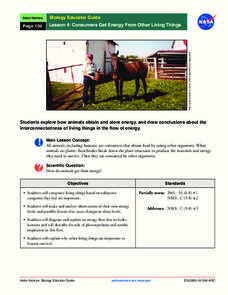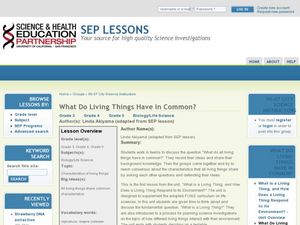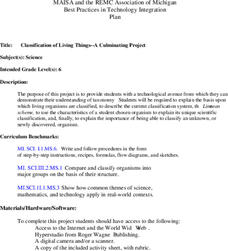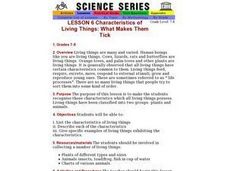Curated OER
Classifying Living Things
Learners identify how to classify living things. They classify various concepts including family members, kinds of clothing, numbers, shapes, and vocabulary words. They discuss how to classify various concepts and classify pictures of...
Georgia Department of Education
Living Things/ Nonliving Things
How can you tell if something is living or nonliving? Introduce a set of criteria which can be used to determine which things are alive and which are not. The class discusses the basic needs of all living organisms, checks out an...
Curated OER
Living-Nonliving
Students determine that environments have living and nonliving parts. They discuss what makes something a living thing and something a nonliving thing. They make a chart and list characteristics of living things and nonliving things.
Casimir Middle School
Biological Classification Worksheet
Classify living things with a set of worksheets that has pupils sorting and indentifying living and non-living things. Learners use the worksheets as a basis for finding their answers.
Curated OER
I Know What I Am... but, What Are You? (Classifying Living Things)
Learners examine how to classify living things by effects, environment, and activity. They explore various websites, develop a list of facts they learn about classifications, and participate in a distance online learning session with the...
NASA
Consumers Get Energy From Other Living Things
How do plants and animals get their food? Learn about where energy comes from, how animals store energy, and aerobic respiration, in a instructional activity that allows scholars to diagram energy flows.
Curated OER
Living vs. Non-Living Things
Fourth graders describe the characteristics that determine if something is living, dead, or non-living. They determine the difference between living and non-living things. Students determine if an object is living or non-living and...
Curated OER
Classifying Living and Non-Living Objects
Students investigate living organisms and define the properties of a living species. In this life characteristic lesson plan, students examine plants in their class and discuss whether or not they are alive. Students create a living...
Curated OER
What Do Living Things Have In Common?
Students explore the concept of classification. In this classification lesson, students collaborate to create lists of living thing similarities in order to differentiate between living and non-living things. Students create a list of...
Science 4 Inquiry
The Classification of Living Things
It's a classification sensation! Demystify why we classify using an inquiry activity that helps your class sort things out. Groups begin by classifying a variety of shoes before they research organisms and design their own dichotomous...
Curated OER
Classifying Objects
Fourth graders classify living things according to similarities and differences through guided and independent activities. They place objects into groups according to their characteristics and then make a collage of living things...
Curated OER
Dinosaurs
Second graders classify and analyze living things by structure and function and make predictions based on observations rather than random guesses. They make predictions about where dinosaurs lived and correctly place their databases onto...
Curated OER
Science – How Living Things are Grouped
In this classification of living things worksheet, learners respond to 7 short answer, 10 true or false, 4 multiple choice, and 4 graphic organizer questions regarding how living things are grouped.
Curated OER
The World of Living Things
The World of Living Things is the focus of this biology presentation. Students view a presentation which introduces them to cells, parts of cells, microorganisms, and simple vs. complex animals. They see that they are classified as a...
Alabama Learning Exchange
Classification
Learners examine why scientists classify living organisms. They list and classify items they buy at the grocery store, sort and classify leaves, explore various websites, and write a biography of Carolus Linnaeus.
Curated OER
Sorting Living and Nonliving Objects
Third graders sort and classify objects. In this sorting lesson, 3rd graders sort small objects such as cereal or candy. Then, students classify and sort objects that are living or nonliving.
National Park Service
Living & Non-Living Interactions
What better way to learn about ecosystems than by getting outside and observing them first hand? Accompanying a field trip to a local park or outdoor space, this series of collaborative activities engages children in learning about the...
Curated OER
Classifying Living Things Wordsearch
In this biology worksheet, students locate and identify various vocabulary terms related to classifying living things. There are 24 biology terms located in the word search.
Curated OER
Life And Death
Students participate in an interactive game to review how living things are classified.
Curated OER
Classifying Living Things
In this classification worksheet, students read a description of how all living things are related and describe a diagram showing how this taxonomy works. Students answer five questions related to their reading.
University of Southern California
What Lives In The Ocean?
One of the most diverse environments on Earth is the ocean. Young scientists explore the living things found in the ocean during an exciting seven-lesson unit. Their study includes organisms from plankton to invertebrates and vertebrates...
Curated OER
Classification of Living Things
Sixth graders are provided with a technological avenue from which they can demonstrate their understanding of taxonomy. They will be required to explain the basis u pon which living organisms are classified.
Curated OER
Characteristics of Living Things: What Makes Them Tick
Students list the characteristics of living things and give specific examples of living things exhibiting these characteristics. They bring in examples of living things.
Curated OER
Living vs. Nonliving
Students explore the characteristics that distinguish living things from nonliving things. Students examine video clips and still photographs to gather evidence and develop criteria to decide if something is living or nonliving.























